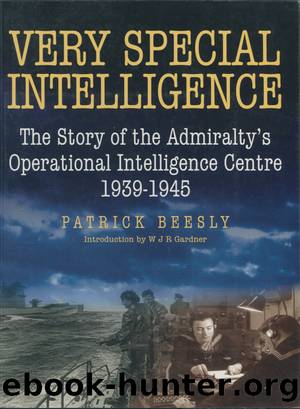Very Special Intelligence by Patrick Beesly

Author:Patrick Beesly [Beesly, Pateick]
Language: eng
Format: epub
Publisher: Pen & Sword Books
Published: 2000-11-21T00:00:00+00:00
* * *
5*
* It was, of course, Special Intelligence but Roskill could not refer to this at the time he was writing.
* It is of interest to note that when the German squadron did in fact sail on the following afternoon, it was reported by British and Russian submarines and by reconnaissance aircraft.
* See Godfrey: Memoirs. Typescript.
* Perhaps because of insufficient fuel.
* See Godfrey: Memoirs. Typescript.
CHAPTER NINE
JulyâDecember 1942.
The Indian Ocean and Torch
IT IS now time to return to the U-boat war. The increased building and training programme was finally beginning to bear fruit. The 140 U-boats operational in July 1942 had increased three months later to 196. Despite diversions to the Mediterranean and the Arctic, Dönitz at last had a really substantial force available for operations in the Atlantic. He was now able, at one and the same time, to concentrate Wolf Packs of up to twenty boats against the North Atlantic and U.K.-West African convoys, to continue the campaigns in the Caribbean, off Freetown and off Brazil and to fulfil his long deferred wish to attack the focal area off Cape Town.
In the middle of August he sailed four large Type IX C-boats* and a U-tanker from French ports for this purpose. They were followed at intervals by four new and even larger U-cruisers of the Type IX D2 class. They were allowed to attack anything they encountered until they had reached latitude 5 degrees South, but from there on they were to restrict themselves, as the Paukenschlag boats had done before them, to large and valuable targets. It was important that the British should not receive any indication of their ultimate destination. Special Intelligence had given us forewarning of the attack on the United States seaboard, but with the âblack-outâ through which we had been groping since February, it was surely asking too much to expect Winn to produce an equally accurate prediction about Dönitzâs latest objective.
It is therefore of interest to note that on August 3, before the first South Atlantic boats sailed, Winn, in considering the disposition of U-boats in the Freetown area and the possibility that some of them might be moved towards Ascension, should have gone on to say âIt is possible that U-boats may proceed even further south.â (In December 1941 four U-boats were sent to operate off Gape Town, but had to return at once owing to the sinking of their supply ships.)* Once again Winn and Dönitz were thinking along the same lines.
The departure of the four boats and the Milch Cow did not, of course, go unnoticed in the Tracking Room. It was a fair deduction that they were destined for operations in distant waters, but was it to be the Caribbean, Brazil, Freetown or the Congo? Brazil was now at war with Germany and there were pickings in plenty to be had off Recife; or would Dönitz be tempted to go for the vital meat trade off the River Plate, despite Argentinaâs continued neutrality? There were many possibilities to choose from.
Download
This site does not store any files on its server. We only index and link to content provided by other sites. Please contact the content providers to delete copyright contents if any and email us, we'll remove relevant links or contents immediately.
The Radium Girls by Kate Moore(12027)
100 Deadly Skills by Clint Emerson(4924)
Rise and Kill First by Ronen Bergman(4788)
The Templars by Dan Jones(4689)
The Doomsday Machine by Daniel Ellsberg(4490)
The Rape of Nanking by Iris Chang(4211)
Killing England by Bill O'Reilly(4001)
Stalin by Stephen Kotkin(3965)
Hitler in Los Angeles by Steven J. Ross(3946)
12 Strong by Doug Stanton(3548)
Hitler's Monsters by Eric Kurlander(3341)
Blood and Sand by Alex Von Tunzelmann(3203)
The Code Book by Simon Singh(3189)
Darkest Hour by Anthony McCarten(3129)
The Art of War Visualized by Jessica Hagy(3007)
Hitler's Flying Saucers: A Guide to German Flying Discs of the Second World War by Stevens Henry(2754)
Babylon's Ark by Lawrence Anthony(2676)
The Second World Wars by Victor Davis Hanson(2524)
Tobruk by Peter Fitzsimons(2516)
